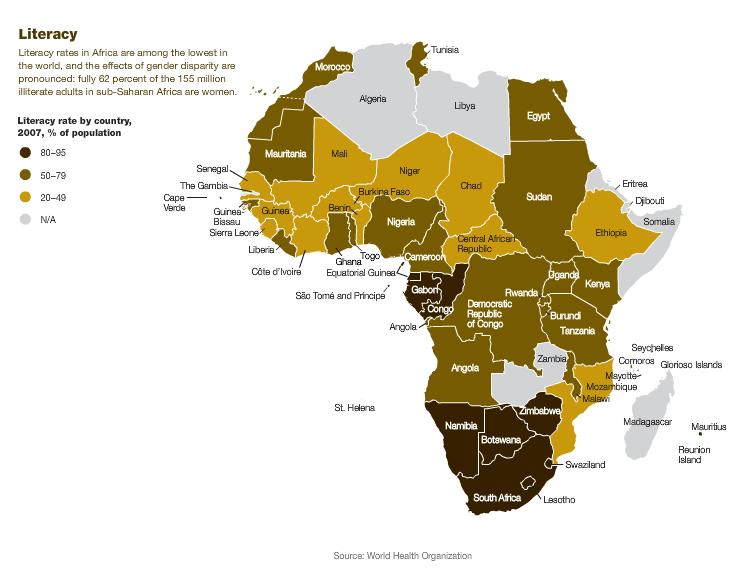Ei ole. Pahoittelut jos särjin sydämesi. Ehkä se on lopulta niin että vain Länsimaissa ihmiset käyttäytyvät loogisesti ja muissa kulttuureissa ihmiset ovat epäloogisia. Ilman historiallisia prosesseja he saattavat mennä toisinaan vähän sekaisin ja tehdä mitä sattuu. Sellaisia ne villit ovat.
Sivistyneessä maailmassa tehdään sellaista asiaa kuin kalanviljely. Suomessa vuonna 2006 kalankasvatus toi 63% kalantuotannon arvosta, nyt luku lienee vieläkin suurempi. Kalanviljelyn ansiosta monet Suomen luontaiset lohipitoiset vesistöt ovat pysyneet elinvoimaisina.
Miksi maailman vesiviljelystä (kalojen ja selkärangattomien vesieläinten kasvatuksesta) 80% tapahtuu Aasiassa, vaikka afrikassa on samankaltaiset olosuhteet?
Kaikkien tutkimusten mukaan kalanviljely lisääntyy tulevaisuudessa kaikkialla maailmassa,`joten onko buurien ja orjalaivan tervan myyneiden suomalaisten vika, ettei afrikassa tämäkään onnistu? ilmeisesti meidän tulee nyt sitten lisätä kehitysapua ja myöntää lisää maahanmuuttolupia somaleille, jotta tämä heidän omasta saamattomuudestaan johtuva vääryys sitten korjaantuisi?
Tuossa on muuten tutkimusta aiheesta:
Management Challenges of Freshwater Fisheries in Africa
--- Lainaus ---For all their fisheries potential as a dominant economic good, the degradation of the lakes
through population expansion, over-fishing, agricultural production with irrigation water,
biodiversity loss and pollution are among the major but diverse challenges that have arisen.
What then are the management challenges of the fisheries of the different lakes?
How have they come about? How have they been handled?
---
Degradation of fisheries and the lake resources normally starts with over-population followed
by over-exploitation of the resources, which leads to a decline in fish stocks. This can be
followed by introduction of new fish species to improve catches (Ogutu-Ohwayo & Hecky
1997). Increase in human and livestock population increases pressure on land, which
increases waste production, and contamination of aquatic systems, loss of the fish habitat and
fisheries. If these factors are not controlled, they can lead to total loss and abandonment of
the fishery. Many of the freshwater fisheries resources and the fish habitats of African
freshwaters are at different levels of resource and environmental degradation and some could
diminish if no interventions are made. The major challenges to fisheries resources in Africa
include: High populations in Lake basins; Unsustainable fishing practices; Species
introductions; Loss of aquatic biodiversity; Pollution and eutrophication; Invasive weeds;
Inadequate policy and legal regimes; Inadequate institutions, institutional mechanisms and
governance including stakeholder commitment and participation; and Inadequate and
unsustainable funding mechanisms.
---
Actions are required to address the management challenges and to reduce threats to African
fisheries include: control of population increases in lake basins; Manage fisheries resources
sustainably (including control of effort, elimination use of destructive fishing gears and
methods and capture of immature fish); Develop guidelines on species introductions;
Conserve and sustainably use aquatic biodiversity; Prevent and Control eutrophication and
pollution; Control invasive weeds; Manage water withdrawal; Manage health issues related to
aquatic systems; Manage Climate change; Set up and enforce appropriate policies, laws and
regulations; Develop efficient and effective institutions and institutional processes and
governance which involve stakeholders in planning and implementation; and Develop
sustainable funding mechanisms for implementing fisheries programs.
---
The fisheries development objective in virtually all the countries is to ensure increased and
sustainable fishery product and a healthy fish habitat. There is interest in sustainable
management of fisheries and the fish habitats at international, regional and national levels.
This has led to a number of international and regional conventions, protocols, and
agreements. A few examples of these include the conventions of Biological Diversity, CBD,
the Convention for International Trade in Endangered Species of Wild Fauna and Flora
CITES, the Convention for Establishment of Lake Victoria Fisheries Organisation, the Code
of Conduct for Responsible Fisheries, the International Plan of Action to deter and eliminate
Illegal Unreported and Unregulated Fish, IPOA / IUU. At national levels, there have been
efforts towards sustainable resource use and environmental project through setting up
national environmental action plans and authorities to implement the plans. Despite all these
efforts, fisheries stocks have continued to decline. This may be attributed to lack of effective
action.
The riparian states of most of the lakes have fisheries and environmental policies for
management of lake ecosystems. Virtually all countries have fisheries laws and regulations. ... There
is also poor enforcement of available laws and regulation leading to continued resource degradation.
There is, therefore need to have the laws updated regularly but more importantly, the laws need to
be enforced.
---
Africa is rich in freshwater resources, which are of value to the communities. The resources
are under threat and have continued to deteriorate despite many effort by national and
regional institutions with national and international support. The experience so far show that
there has been lack of effective action due to, limited accessibility and application of
scientific information; poor dissemination of management information; inappropriate and is
some cases un-harmonised fisheries laws and regulations; inadequate enforcement of existing
laws and regulations; Weak institutions and institutional processes; and inadequate funds to
implement fisheries programs. There is need to: Make appropriate information and data
available to guide decision and formulation of policies, laws and regulations for sustainable
management of the fisheries resources and the fish habitats; Provide appropriate policies,
laws, regulations, and standards to be used in management efforts; Establish and develop
effective institutions, institutional mechanisms including community participation to provide
the required data and information, promote sustainable use practices, and enforce laws and
regulations; and to Provide adequate financial resources and human capacity to implement
fisheries programs.
Wikipediasta:
Vesiviljelyn osuus on tällä hetkellä n. 29 % maailman kalastuksen kokonaistuotannosta. Sen odotetaan kasvavan rajusti tulevaisuudessa.

